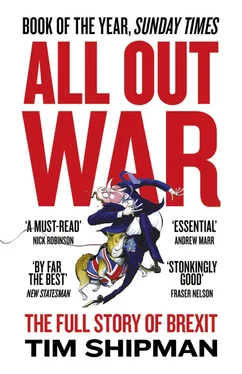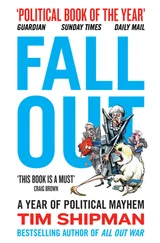Tim Shipman - All Out War - The Full Story of How Brexit Sank Britain’s Political Class
Здесь есть возможность читать онлайн «Tim Shipman - All Out War - The Full Story of How Brexit Sank Britain’s Political Class» — ознакомительный отрывок электронной книги совершенно бесплатно, а после прочтения отрывка купить полную версию. В некоторых случаях можно слушать аудио, скачать через торрент в формате fb2 и присутствует краткое содержание. Жанр: unrecognised, на английском языке. Описание произведения, (предисловие) а так же отзывы посетителей доступны на портале библиотеки ЛибКат.
- Название:All Out War: The Full Story of How Brexit Sank Britain’s Political Class
- Автор:
- Жанр:
- Год:неизвестен
- ISBN:нет данных
- Рейтинг книги:3 / 5. Голосов: 1
-
Избранное:Добавить в избранное
- Отзывы:
-
Ваша оценка:
- 60
- 1
- 2
- 3
- 4
- 5
All Out War: The Full Story of How Brexit Sank Britain’s Political Class: краткое содержание, описание и аннотация
Предлагаем к чтению аннотацию, описание, краткое содержание или предисловие (зависит от того, что написал сам автор книги «All Out War: The Full Story of How Brexit Sank Britain’s Political Class»). Если вы не нашли необходимую информацию о книге — напишите в комментариях, мы постараемся отыскать её.
All Out War: The Full Story of How Brexit Sank Britain’s Political Class — читать онлайн ознакомительный отрывок
Ниже представлен текст книги, разбитый по страницам. Система сохранения места последней прочитанной страницы, позволяет с удобством читать онлайн бесплатно книгу «All Out War: The Full Story of How Brexit Sank Britain’s Political Class», без необходимости каждый раз заново искать на чём Вы остановились. Поставьте закладку, и сможете в любой момент перейти на страницу, на которой закончили чтение.
Интервал:
Закладка:
The issue that calcified Eurosceptic suspicion of Cameron was his ‘cast-iron guarantee’ in September 2007 that he would hold a referendum on the Lisbon Treaty, which greatly deepened EU integration. Once the treaty was ratified in every EU country, including by Gordon Brown’s Labour government, Cameron ditched the pledge, arguing that a referendum was pointless. He sought to placate the Eurosceptics with a speech in November 2009 announcing a ‘referendum lock’, ensuring a vote on any future European treaty ‘that transferred areas of power or competences’ from Britain to Brussels. It was a poor substitute for the in/out vote the sceptics craved. More importantly, as the then Tory MP Douglas Carswell observed, Cameron’s original promise, ‘although we reneged on it, established the legitimacy of a referendum’.
Even pro-Europeans look back on Cameron’s decision with regret, since it meant that if there was to be a referendum in future, it would be an all-or-nothing proposition. Tory MP Alistair Burt said, ‘I argued that the first chance the British people were going to get to vote on the EU they’d vote “No”, no matter what the question was. I would far rather have had a question on a constitutional issue than “In” or “Out”.’
With hindsight, the moment a referendum became inevitable occurred in October 2011. When more than 100,000 members of the public signed a petition demanding a nationwide vote, Conservative backbencher David Nuttall – whose name was regarded by Downing Street as eloquently descriptive – proposed a Commons motion calling for a referendum. Instead of letting the sceptics sound off in a vote that was not binding, Cameron unwisely turned the showdown into a trial of strength, ordering his backbenchers to vote it down. ‘We cannot lie down on this,’ he told his closest aides.4 It is understandable that he felt like imposing some order. By that point, seventeen months into the coalition government, Cameron had already endured twenty-two backbench rebellions on Europe, involving a total of sixty MPs.5 He ordered an ‘industrial-scale operation’ to rein in the sceptics.6 Word spread that anyone voting for the motion would be barred from ministerial office for four years, or even face deselection. Despite the threats, and to Cameron’s consternation, eighty-one Conservatives backed the motion, the biggest rebellion on Europe since the Second World War. At John Major’s worst moment during the passage of the Maastricht Bill in 1993 only forty-one Tory MPs had defied the whip. Without the heavy-handed whipping the rebel leaders could have mustered 150 votes against their own government. As young MPs, Cameron and Osborne had seen loyalty as the currency of promotion; now they were confronted by people who put principle first.
One of Cameron’s closest aides said, ‘For me the pivotal moment was the eighty-one rebellion. It was clear after that that the parliamentary party would not stand for anything but a referendum by the next election. I think the PM knew instinctively that was where he was going to end up.’ It would be another nine months before Cameron accepted that logic, and fifteen before he did anything about it.
Cameron may not have wished to focus on Europe, but the eurozone crisis ensured that he had no choice. The Greek economy plunged into chaos shortly after the ‘referendum lock’ speech, and attempts to prevent an ‘Acropolis Now’ collapse preoccupied the EU into 2012.
Two months after the Tories’ Commons rebellion, in December 2011, the nations in the eurozone demanded a Fiscal Compact Treaty to prop up their ailing currency. Cameron and Osborne sought protections for the City of London. In a strategy which he was to test to destruction, Cameron focused his negotiating efforts on Angela Merkel. They had a good relationship. The German chancellor had been to Chequers in 2010, when they kicked back watching episodes of Midsomer Murders . ‘Just think, all this could have been yours,’ Cameron had joked.7 After a lunch in Berlin, Cameron thought she was on-side, but she then went behind his back to do a deal with the French. A senior diplomat said, ‘We didn’t know what was happening, not even through covert channels. We were completely screwed over.’ Cameron, realising he had been ambushed, called to warn Merkel, ‘I’ll have to veto.’ She replied, ‘In that case I’ll have to do it without you.’8 On the evening of 8 December Cameron went alone into the summit room with twenty-six other leaders and found himself in a minority of one. At 4 a.m. he walked out.9
‘We renamed it a veto to claim it was a veto,’ one Downing Street aide recalled. Cameron’s refusal vetoed nothing. The other twenty-six nations simply signed a separate treaty outside the EU apparatus. But Cameron was lauded at home as a latterday Thatcher, standing magnificently alone against the tide of integration. A Number 10 source recalled, ‘Firstly, he never thought he was going to veto it. It was initially, “Oh fuck, what have we done?” Then the polls went up. It was a completely accidental triumph. The Foreign Office thought it was the end of the world.’ The veto affair showed all too clearly that, despite her warm words, Merkel would not deliver for Cameron if she thought Germany’s national interest and the good of the EU lay elsewhere. It was a lesson Cameron would have done well to learn there and then.
Cameron’s honeymoon with the sceptics was brief. In June 2012, with Downing Street on the back foot over George Osborne’s so-called ‘omnishambles’ budget, one hundred Tory MPs signed a letter, penned by Basildon MP John Baron, calling for legislation guaranteeing a referendum in the next Parliament. Two days later, at a summit in Brussels, Cameron rejected that plan. The Eurosceptics went into meltdown. ‘The PM and the chancellor looked like they were seriously losing authority over the party,’ a Downing Street source remembered.
In a bid to clean up the mess, Cameron wrote an article for the Daily Telegraph saying he was ‘not against referendums on Europe’, but that the time would not be right for an ‘in/out’ vote until Britain had ‘define[d] with more clarity where we would like to get to’.10 It was the first public expression of his desire for a new deal. Once again he had edged closer to a destination he did not desire, in order to placate people whose support he did not really want. Once again he had neither settled the issue to the satisfaction of his critics, nor properly confronted them. When Cameron told Nick Clegg about the article, the deputy prime minister told him he was ‘crazy’ to think he could buy off his critics. ‘I have to do this,’ Cameron insisted. ‘It is a party management issue.’11 Viewed after the political bloodbath that followed, the notion that holding a referendum might calm Tory divisions was farcically naïve.
It was the rise of the UK Independence Party (Ukip), and growing concern about immigration, that finally forced Cameron’s hand. The eurozone crisis sent unemployment soaring, inspiring hundreds of thousands of people to flock to Britain to find work. Cameron’s pledge to reduce net annual immigration to the ‘tens of thousands’ a year became untenable. The pressure this brought to bear on public services, coupled with the growing public view that yet another politician’s promise was worthless, was deftly exploited by the blokeish but charismatic Ukip leader Nigel Farage, whose ‘people’s army’ combined traditional EU constitutionalist pub bores with an anti-establishment grassroots movement that tapped into broader discontent with the Westminster elite. With the Liberal Democrats as partners in the coalition government, Farage was able to hoover up protest votes which traditionally went to the third party. By the autumn of 2012 Ukip were the third party, consistently above the Lib Dems in the polls. In November Ukip grabbed second place in two by-elections in Rotherham and Middlesbrough. Cameron decided he had to act. He would have to enter the 2015 general election campaign with a pledge to hold a referendum.
Читать дальшеИнтервал:
Закладка:
Похожие книги на «All Out War: The Full Story of How Brexit Sank Britain’s Political Class»
Представляем Вашему вниманию похожие книги на «All Out War: The Full Story of How Brexit Sank Britain’s Political Class» списком для выбора. Мы отобрали схожую по названию и смыслу литературу в надежде предоставить читателям больше вариантов отыскать новые, интересные, ещё непрочитанные произведения.
Обсуждение, отзывы о книге «All Out War: The Full Story of How Brexit Sank Britain’s Political Class» и просто собственные мнения читателей. Оставьте ваши комментарии, напишите, что Вы думаете о произведении, его смысле или главных героях. Укажите что конкретно понравилось, а что нет, и почему Вы так считаете.












